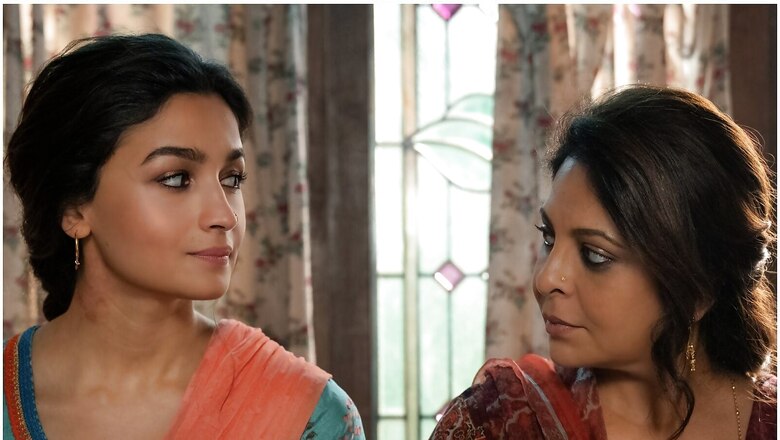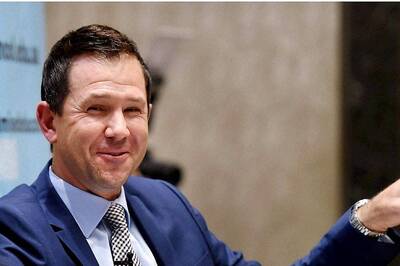
views
What happens when you have a stunning cast assembled for a movie based on a vulnerable and sensitive subject? You expect a masterpiece in the making. But what pans out when these stalwarts become one of the secondary reasons to make it worth a watch? ‘Darlings’ does.
Darlings is a recent addition to the list of social commentary-based movies which leave you introspecting about the society and the circumstances that prevail in them. It deals with a matter which remains concealed behind closed doors and underneath hushed tones.
While this isn’t the first time Bollywood has delved into the world of social commentary, the use of black comedy brings out the much needed nuances associated with the subject. And that’s how Darlings hits you when you least expect it.
Bollywood has delivered the likes of Secret Superstar, Parched and Thappad among a line of others that have dealt with this social disorder in the past. So is it just the use of ‘black comedy’ that marks Darlings as the odd one out in this category?
Alia Bhatt, Shefali Shah and Vijay Verma portray three characters whose lives take a rather sudden turn as they come across the antagonist of the movie — domestic abuse. They are all victims of the said disorder, one way or the other. The question that they leave the audience with is: are legal measures enough to tackle it in reality?
A victim of domestic abuse gets wounded at several levels — physical, emotional and mental. While legal measures like Article 498A exist in our IPC, it is only over the decades that emotional impact of this abuse has been considered a criterion of concern too. This movie emphasises how the former is nowhere close to being a solution all by itself in this situation.
The element of black comedy added in this movie is nothing less than a coping mechanism that a woman being on the receiving end of this abuse develops. In this case Badru’s constant confusion regarding her feelings towards Hamza is what results in the hesitation to lodge a complaint against him. And this is despite her having access to support from her family, the society and law. The abuse hits at a much deeper level, making the victim question the very principles of what they thought was going to be a successful relationship.
However, since Badru’s access to a strong support system isn’t the norm under most circumstances, her story is constantly compared to her mother’s, who was a victim to the same crime in the past.
The black comedy isn’t a sugar coat. Instead it is a rather symbolically nuanced delivery of a social message which brings out the realities of this social disorder with more clarity. It sheds light on quite a common and prominent syndrome associated with the abuse — victim blaming.
In a majority of cases involving domestic abuse, this turns out to be the reason keeping one from lodging a complaint. “What if it is me driving him/her to behave this way?” That’s where they enter the toxic cycle of self-doubt, eventually leading them to repress their own agonies as a victim. Moreover, this mentality gets fuelled further with the constant hope associated with their abuser: the hope for them to change their ways. The victims then are seen to push themselves down an alley of compensation. They indulge in behaviour which they feel might help the abuser get off their abusive ‘phase’.
While those were two major reasons restricting them to stand up for themselves, it doesn’t end there. It brings us to another aspect of the victim’s mentality that has been highlighted in the movie. The lengths to which one is seen to rationalise the behaviour of an abuser.
In this movie, it is alcoholism which is initially blamed as the culprit. While alcoholism in itself is a behaviour that needs to get checked, it can in no way be a reason for excusing abuse of any sorts. It is only towards the end that the couple accepts the main reason behind the abuse — Hamza himself.
No reason can rationalise a crime of this sort, be it frustration at work, the need to vent out, the yearning for a power trip, or substance abuse. These might be triggers to such abuse, but the mentality has always been a part of the partner’s subconscious, only waiting to be unleashed on one unfortunate day.
And the minute the first instance of abuse is let go of as an impulsive act under the pressure of heated circumstances, there is no end to the tyranny.
All these are expressed through rather power packed performances of the actors — and this makes Darlings an unusual watch. It breaks the bubble of idealistic expectations from a victim and brings out the message loud and clear — the trauma is real, Darlings!
Read the Latest News and Breaking News here



















Comments
0 comment